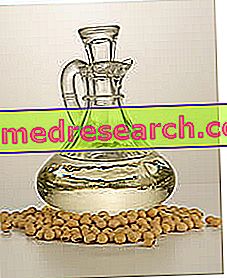Generality
Fish oil is the most generous food source of omega-three, in particular eicosapentaenoic acid (EPA) and docosahexaenoic acid (DHA).
EPA and DHA are two essential fatty acids, which can be synthesized in the human body from an omega-3 precursor, alpha linolenic acid (ALA). This fatty acid, which is also essential, is particularly abundant in walnuts, canola oil, soybean and hemp, as well as in linseed and its oil.

Product quality
Fish, like men, are not able to directly synthesize omega-three, but accumulate them in their tissues by absorbing them from microalgae or from the animals they eat.
Herring, sardines and other large and small bluefish, cod, salmon and tuna are among the richest fish in omega-three. Some of these, like certain species of tuna, shark or verdesca and swordfish, should not be consumed in excessive quantities, since - being at the top of the food chain - they accumulate not only omega-3 in their meat, but also toxins such as polychlorobiphenyls, dioxin, mercury and chlordane.
Since many of these substances, in particular dioxins and some pesticides, are liposoluble, they are found in good concentrations even in fish oil.
It is therefore advisable to pay particular attention to the appropriate choice of the integrator, considering, in addition to the possible presence of contaminants, also the degree of lipoperoxidation of the same fatty acids contained in it.
The most important sources of fish oil are farmed salmon and cod liver; the product, once purified by molecular distillation, is optionally supplemented with tocopherol and enclosed in opercula or gelatin beads.
There are several quality certifications related to the degree of oxidation, to the content of heavy metals and toxic substances; the best known is probably the IFOS (International Fish Oil Standard).
Indications
Why is fish oil used? What is it for?
Fish oil is the main source of omega 3 fatty acids (EPA and DHA), known for their fundamental metabolic properties.
Initially used above all for its hypoglyceridemic properties, fish oil has gained - over time and with many studies - a large role in the preventive and therapeutic field.
The following are now included in fish oil:
- Hypoglylicididemic and hypocholesterolemic metabolic properties;
- Anti-inflammatory properties;
- Antioxidant properties;
- Immunomodulating properties;
- Hypoglycemic properties;
- Neuroprotective properties;
- Hormonal-like properties;
- Antiallergic properties;
- Cardioprotective properties.
For these reasons, fish oil is used in the prevention and control of various diseases, including:
- inflammatory bowel disease,
- autoimmune diseases,
- diabetes,
- cardiovascular diseases,
- neurodegenerative diseases
- allergic diseases.
In recent years, fish oil has also been used successfully in sports.
Property and Effectiveness
What benefit has fish oil shown during the studies?
Among the most studied and best characterized supplements there is certainly fish oil and more precisely its essential fatty acids EPA and DHA.
The amount of studies concerning the preventive and therapeutic usefulness of fish oil has increased dramatically in the last 20 years, thanks also to a refinement of the study techniques.
Fish oil and dyslipidemia
One of the first applications, therefore among the most studied, of fish oil, was the metabolic one.
Several clinical trials have shown that fish oil, at various dosages, may have an appreciable cholesterol-lowering and hypoglyceridemic action.
More precisely, the use of 2-4 g daily would seem effective in reducing blood concentrations of triglycerides by more than 20% in a few weeks and LDL cholesterol concentrations of about 10-15%.
The hypolipidemic activity of fish oil, combined with anti-inflammatory activity, would contribute to the maintenance of cardiovascular health, reducing the risk of possible complications.
These data were further corroborated by studies such as GISSI or by meta-analysis with over 30, 000 participants, in which integration with omega 3, in addition to reducing the number of hospitalizations for acute cardiovascular events, would generally have contributed to reducing mortality.
Today there are registered omega-three based pharmaceutical specialties such as: Seacor, Esapent and Eskim
Fish oil and inflammatory diseases
Particularly interesting are the data deriving from various clinical trials, in which the use of fish oil, already at 3 grams per day, would have been useful in lengthening remission times in diseases such as Crohn's mob, and in improving the picture histological and symptomatic in patients with ulcerative colitis.
The anti-inflammatory effects were useful also in the course of pathologies such as psoriasis, for which the use of fish oil would have contributed to reducing the severity of skin lesions and above all preventing their complications.
Fish oil and neurodegenerative diseases
The literature on the preventive efficacy of fish oil in the neurological and psychiatric fields seems to be fairly unanimous.
According to several authors, in fact, the continuous use of fish oil would reduce histological lesions and the subsequent decay of cognitive, mnemonic, perceptive and motor functions in patients suffering from pathologies such as Alzheimer's or multiple sclerosis.

Fish oil and sports
The anti-inflammatory action of fish oil would have proved useful in endurance athletes, subjected to training sessions or particularly intense competitions.
In this context, fish oil could contribute to the prevention of neuro-muscular injuries related to intense exercise.
The reduction of some markers of muscle damage, the greater ease of recovery and the reduction of the risk of injuries, would testify to the usefulness of fish oil in sports.
Doses and method of use
How to use fish oil
Over time, various fish oil supplements have followed, with different formats and concentrations of omega 3 fatty acids (EPA and DHA).
Classically, with ratios of around 1.5 between EPA and DHA, capsules, capsules or liquid solutions to drink can be found on the market from 300 to 850 mg of omega 3 fatty acids.
In order to preserve the same fatty acids from the harmful lipoperoxidation processes, fish oil supplements should be enriched with antioxidant vitamins, such as vitamin E.
As for the dosages instead, the most used preventive and therapeutic range is that of 1-5 g per day, to be taken preferably during meals.
Classically 5 g / day are used for the management of lipidemic and cardiovascular metabolic disorders, 3 g / day for the management of inflammatory pathologies, 1 g / day for the prevention of oxidative damage.
Side effects
The use of fish oil, up to 15 g per day, has generally proved to be safe and free of clinically relevant side effects.
In most cases, the adverse reactions observed have affected the gastro-enteric system, with nausea, abdominal pain, dyspepsia, diarrhea, halitosis and belching and fishy-flavored regurgitations.
The side effects of the coagulation system were decidedly more rare.
Contraindications
When should fish oil not be used?
The use of fish oil is contraindicated in case of hypersensitivity to the active ingredient or to the food from which it was extracted.
Pharmacological Interactions
Which drugs or foods can change the effect of fish oil?
By virtue of its biological properties, particular care should be taken with the simultaneous intake of fish oil and:
- Aspirin, non-steroidal anti-inflammatory drugs, garlic and ginkgo biloba: due to the increased risk of bleeding due to a double anti-aggregation effect.
Potentially even more serious condition for oral anticoagulants (coumadin, sintrom, warfain, acenocoumarol).
- Oral hypoglycemic agents: for the possible unexpected glycemic variations. In the latter case, given the presence of contradictory studies, it would be very important to evaluate the benefit risk ratio with your doctor.
Precautions for use
What do you need to know before taking fish oil?
The use of fish oil during pregnancy, lactation and early life should be supervised by medical personnel. In this regard, there is plenty of evidence on the importance of an adequate intake of EPA and DHA to ensure optimal brain development of the fetus.
The same attention should be given to patients on drug therapy with anticoagulants and antiplatelet agents, and to patients suffering from diabetes and undergoing hypoglycemic therapy.
The use of fish oil should be suspended before surgery, due to the increased risk of intra-operative bleeding.



